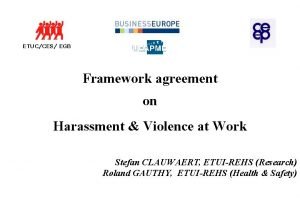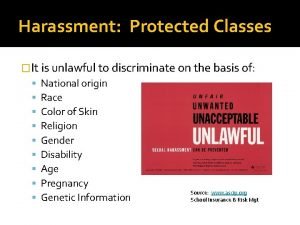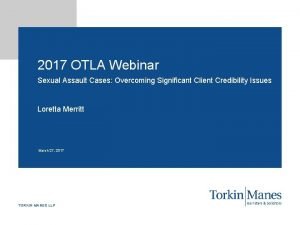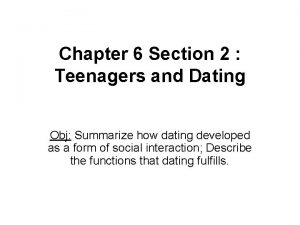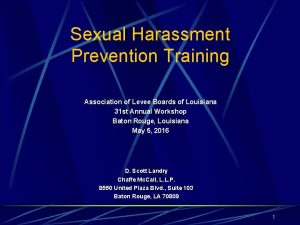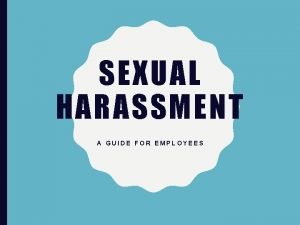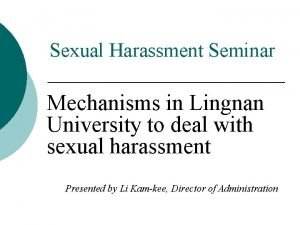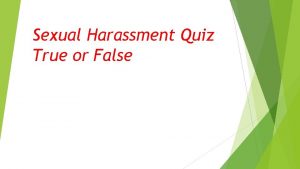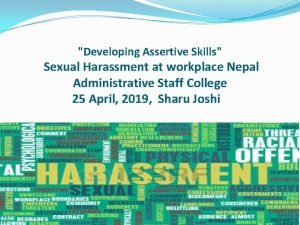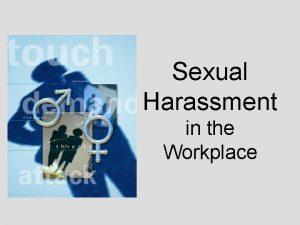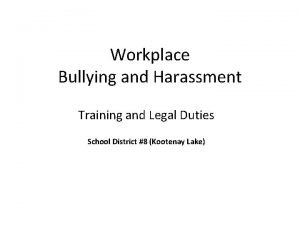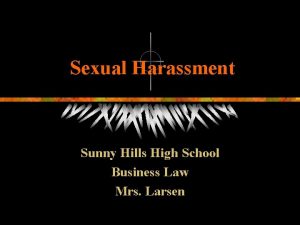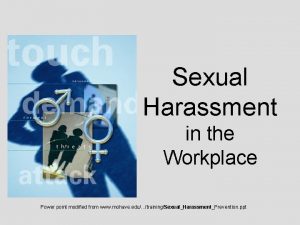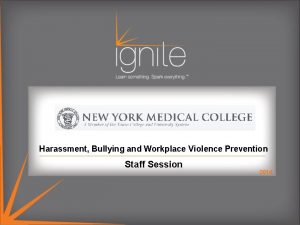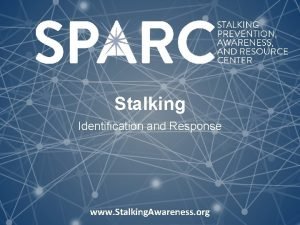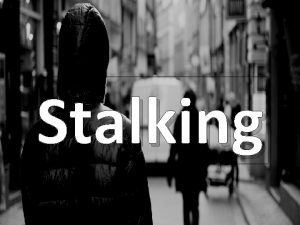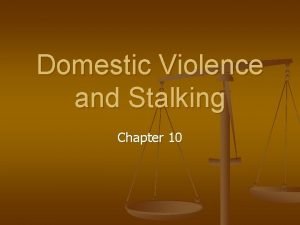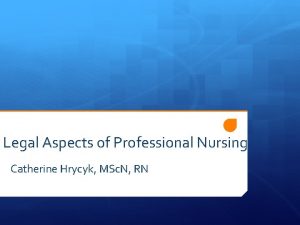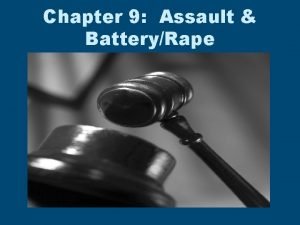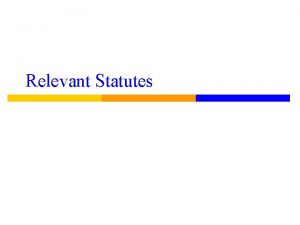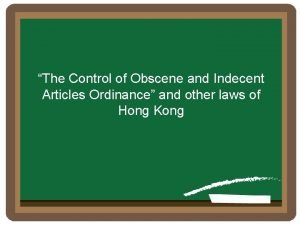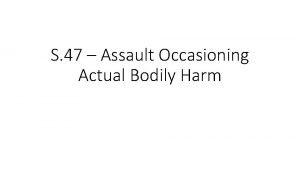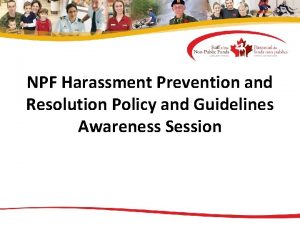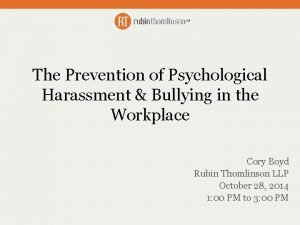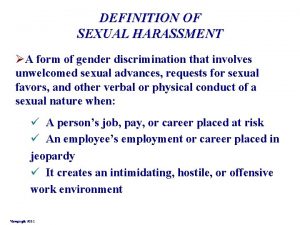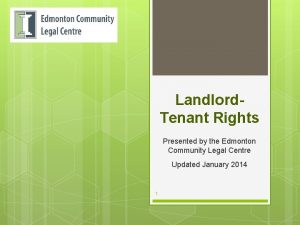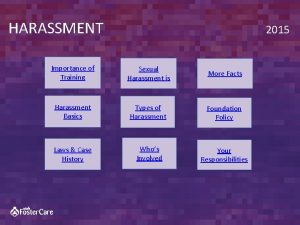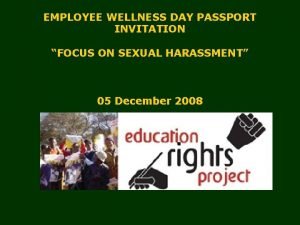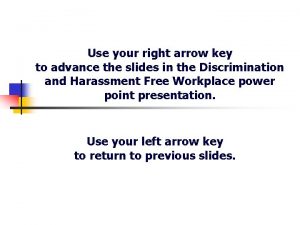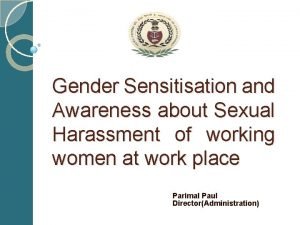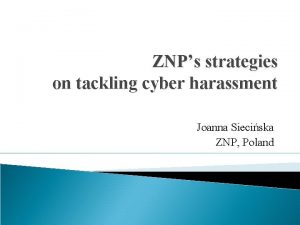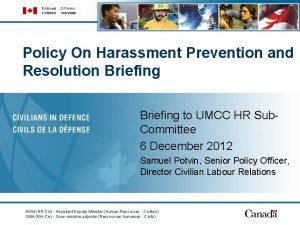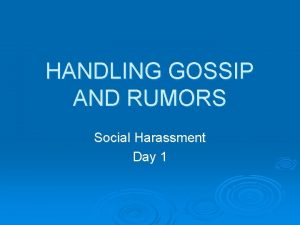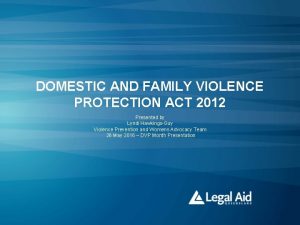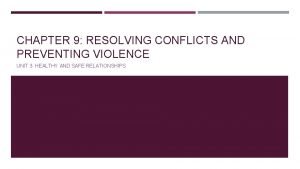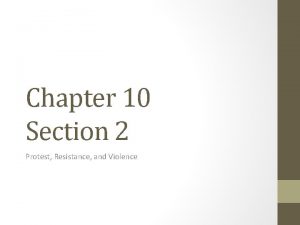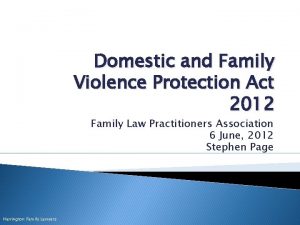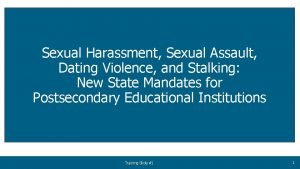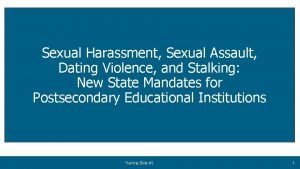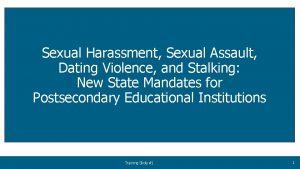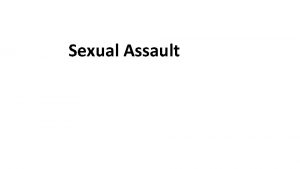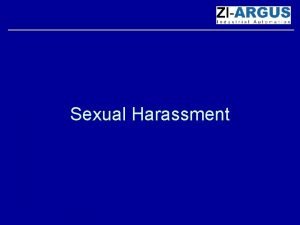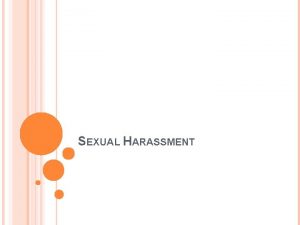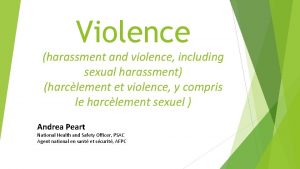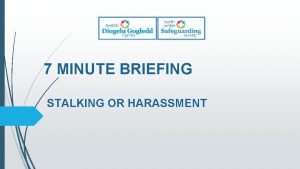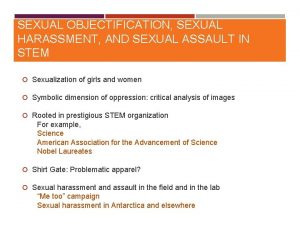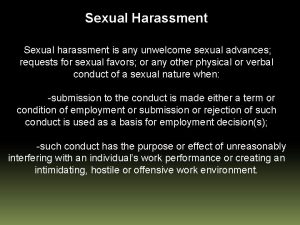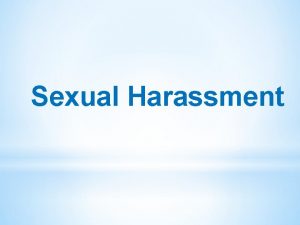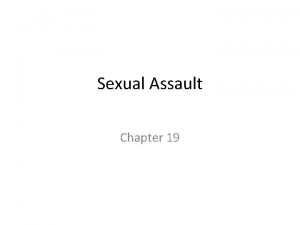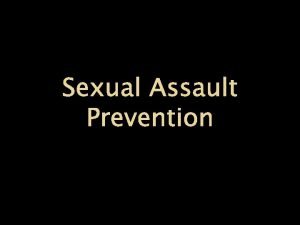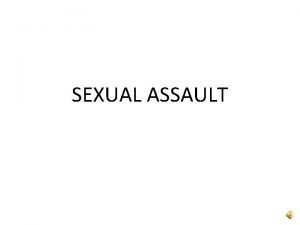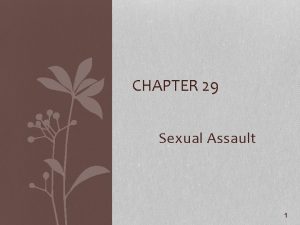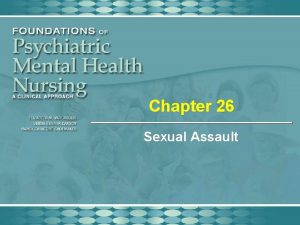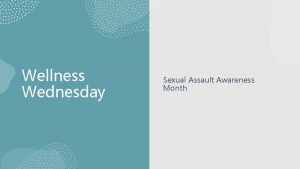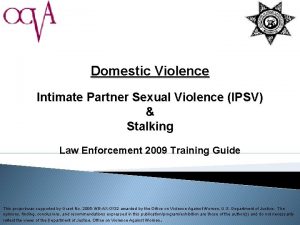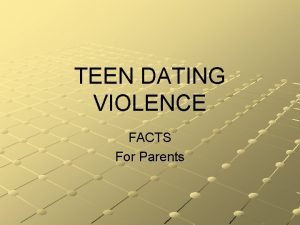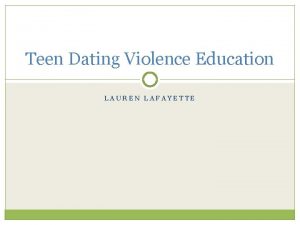Sexual Harassment Sexual Assault Dating Violence and Stalking
























































- Slides: 56

Sexual Harassment, Sexual Assault, Dating Violence, and Stalking: New State Mandates for Postsecondary Educational Institutions Training Slide #1 1

Definition of Terms Training Slide #8 8

Definitions of Reportable Conduct Sexual Harassment "Sexual harassment" means unwelcome, sex-based verbal or physical conduct that: (A) in the employment context, unreasonably interferes with a person's work performance or creates an intimidating, hostile, or offensive work environment; or (B) in the education context, is sufficiently severe, persistent, or pervasive that the conduct interferes with a student's ability to participate in or benefit from educational programs or activities at a postsecondary educational institution. (Citation: Texas Education Code, Sections 51. 251 & 51. 281) Training Slide #9 9

Definitions of Reportable Conduct Sexual Assault “Sexual assault” means an offense that meets the definition of rape, fondling, incest, or statutory rape as used in the FBI's Uniform Crime Reporting program: (A) “Rape” means the penetration, no matter how slight, of the vagina or anus with any body part or object, or oral penetration by a sex organ of another person, without the consent of the victim. (B) “Fondling” means the touching of the private body parts of another person for the purpose of sexual gratification, without the consent of the victim, including instances where the victim is incapable of giving consent because of his/her age or because of his/her temporary or permanent mental incapacity. (C) “Incest” means sexual intercourse between persons who are related to each other within the degrees wherein marriage is prohibited by law. (D) “Statutory Rape” means sexual intercourse with a person who is under the statutory age of consent. (Citation: 34 Code of Federal Regulations (CFR) 668. 46) Training Slide #10 10

Definitions of Reportable Conduct Dating Violence “Dating violence” means violence committed by a person who is or has been in a social relationship of a romantic or intimate nature with the victim. (A) The existence of such a relationship shall be determined based on the reporting party's statement and with consideration of the length of the relationship, the type of relationship, and the frequency of interaction between the persons involved in the relationship. (B) For the purposes of this definition— (1) Dating violence includes, but is not limited to, sexual or physical abuse or the threat of such abuse. (2) Dating violence does not include acts covered under the definition of domestic violence. (Citation: 34 CFR 668. 46) Training Slide #11 11

Definitions of Reportable Conduct Stalking “Stalking” means engaging in a course of conduct directed at a specific person that would cause a reasonable person to fear for the person's safety or the safety of others; or suffer substantial emotional distress. For the purposes of this definition: (A) Course of conduct means two or more acts, including, but not limited to, acts in which the stalker directly, indirectly, or through third parties, by any action, method, device, or means, follows, monitors, observes, surveils, threatens, or communicates to or about a person, or interferes with a person's property. (B) Reasonable person means a reasonable person under similar circumstances and with similar identities to the victim. (C) Substantial emotional distress means significant mental suffering or anguish that may, but does not necessarily, require medical or other professional treatment or counseling. (Citation: 34 CFR 668. 46) Training Slide #12 12

Sexual Misconduct Policy Mandates • Your institution’s policy must: • Be in the student and personnel/faculty handbooks or institutional equivalents • Have a webpage dedicated to the policy • Include a clearly identifiable link on the institution’s homepage Training Slide #16 16

Equal Access Postsecondary educational institutions shall ensure equal access for disabled employees and students. • Institutions shall make reasonable efforts to consult with the disability services office of the institution and/or advocacy groups to ensure access for disabled (differently-abled) students and employees. • Institutions should ensure websites, policies, and forms are accessible to disabled (differently-abled) employees and students. Training Slide #21 21

Equal Access Example: A student who is blind wishes to report an incident to the Title IX Coordinator. The Title IX Coordinator must ensure the student has equal access to reporting forms, websites, and policies. Training Slide #22 22

Employee Reporting Requirements Training Slide #23 23

New Reporting Requirements • All employees* must promptly report to the institution’s Title IX coordinator or deputy coordinator: • Observations witnessed or information received while in the course and scope of their employment; • That the employee reasonably believes constitutes an incident of sexual harassment, sexual assault, dating violence, or stalking; • Committed by or against • A student who was enrolled at the institution at the time of the incident • An employee employed by the institution at the time of the incident * Four categories of employees are excepted from mandatory reporting. Training Slide #24 24

New Reporting Requirements Example: An accountant in the business office is out to eat at a restaurant with friends on a Saturday evening. During dinner, the accountant overhears someone from the next table talking about working at your institution and being groped by their supervisor. Does the accountant have the report to the Title IX Coordinator? The Texas law would not require the accountant to report, because the accountant was engaged in a personal activity at the time they heard the information and was not performing duties to further the institution’s interests. However, the institution’s policy may impose different requirements. Training Slide #25 25

What must be reported by an employee? • ALL INFORMATION, unless the report is made to an employee who is designated or licensed to maintain confidentiality. • An employee must report: • All information relevant to the incident known to the employee • • Regardless of when or where the incident occurred For purposes of the institution’s investigation To redress the incident via interim measures or other forms of support To convey an alleged victim’s request for confidentiality Training Slide #26 26

What must be reported by an employee? Example: A lecturer shares with their department chair that a tenured faculty member in the department made unwanted sexual advances toward the lecturer. The lecturer asks the department chair to keep the concern anonymous. Can the department chair withhold the lecturer’s name when making the report to the Title IX Coordinator? No. The department chair must share all information known to them with the Title IX Coordinator. The department chair should indicate that the lecturer wishes to remain anonymous, and the Title IX Coordinator will take that into account in moving forward with the matter. Training Slide #27 27

Circumstances in which Employees Must Report • Employees shall promptly report information regarding the occurrence of an incident the employee reasonably believes constitutes sexual harassment, sexual assault, dating violence, or stalking committed by or against a person who was or is a student or employee of the institution at the time of the alleged misconduct. • The employee shall report information that they witness, receive first hand, receive second hand or via “hearsay, ” overhear, or are otherwise made aware of. Training Slide #28 28

Circumstances in which Employees Must Report • The employee is required to report regardless of when or where the incident occurred. • The exception is when incidents are disclosed at a sexual harassment, sexual assault, dating violence, or stalking public awareness event sponsored by the institution or by a student organization affiliated with the institution. • The employee is required to report all known details, including if and how the report was remedied and if the alleged victim has expressed a desire to keep the report confidential. Training Slide #29 29

Circumstances in which Employees Must Report Example: Professor Crane receives an email from a student explaining that they had missed class due to being attacked by an ex. The professor contacts the Title IX Coordinator asking if the professor needs to report, as there were very few details included in the student’s email. The professor explains they are not sure of when or where the attack happened, or if it involved a student from their institution. Professor Crane should report regardless of when or where the incident occurred, as it involves a student who is enrolled at the institution. Even if there are very few details, Professor Crane should include them all. Training Slide #30 30

Where should reports be made? • Reports may be made: • Online • INSERT LINK TO REPORTING FORM • To the institution’s Title IX Coordinator • INSERT TIX COORD. INFO • To the institution’s Deputy Title IX Coordinators • INSERT TIX DEPUTY INFO Training Slide #31 31

Where should reports be made? • In addition to the aforementioned reporting options, students and employees may report incidents in which they were a victim of sexual harassment, sexual assault, dating violence, or stalking in confidence to: • • • INSERT DESIGNATED CONFIDENTIAL RESOURCE (STUDENTS VS ALL) INSERT HEALTH PROFESSIONAL INSERT COUNSELING CENTER INSERT MEDICAL RESOURCE INSERT ADVOCACY CENTER INSERT CLERGY Training Slide #32 32

Online Reporting Option for Students & Employees An online reporting option must be available for enrolled students and current employees. The reporting option, at a minimum, must: • be accessible on the institution’s website homepage via a clearly identifiable link • allow for anonymous reporting • allow for reporting of allegations of sexual harassment, sexual assault, dating violence, or stalking committed against or witnessed by the student or employee • be accessible to differently-abled persons Training Slide #33 33

Employees Excepted: Category 1 Employees Who are Students • Employees who are enrolled as students at the institution are not mandatory reporters. • However, employees may be mandatory reporters under their institution’s policies, regulations, rules, or procedures. Training Slide #34 34

Employees Excepted: Category 1 Employees Who are Students Example: The institution designates students who work in student housing as employees who are required to report sexual harassment, sexual assault, dating violence, and stalking. A student tells their resident advisor that the student has been sexually harassed by a staff member. Is the resident advisor required to report? The resident advisor is required by the institution’s policy (but not by Texas law) to report. Sanctions for failure to report are determined solely by the institution’s policy. The Texas law requiring mandatory termination and criminal liability would not apply. Training Slide #35 35

Employees Excepted: Category 2 Employees Who are Victims • Victims of sexual harassment, sexual assault, dating violence, or stalking are not mandatory reporters of/for their own incident. Training Slide #36 36

Employees Excepted: Category 3 Employees Receiving Information at a Public Awareness Event • Employees are not required to report information about an incident that is disclosed at a public awareness event on sexual harassment, sexual assault, dating violence, or stalking. Training Slide #37 37

Employees Excepted: Category 3 Employees Receiving Information at a Public Awareness Event Example: The university’s Women and Gender Resource Center hosted an event during Sexual Assault Awareness Month where victims of sexual violence shared their stories publicly from the stage. During the event, a student shares a poem that details a sexual assault the student experienced during their freshman year. An English professor heard this disclosure during the event. Is the professor required to report this to the Title IX Coordinator? No, required reporters are not required to report disclosures made during public awareness events such as Take Back the Night or events hosted during Sexual Assault Awareness Month. Training Slide #38 38

Employees Excepted: Category 4 Confidential Employees (limited disclosure) • Employees whose institution designates them as persons with whom students may speak confidentially may be limited in the information they must report. • IF the information they receive was conveyed under circumstances rendering the communication confidential or privileged under other law. • NOTE: Employees designated as confidential employees MUST fully report incidents observed or reported to them under circumstances outside the scope of a confidential communication without limitation. Training Slide #39 39

Employees Excepted: Category 4 Confidential Employees (limited disclosure) Example: Ifeoma is a counselor in the university’s Student Counseling Center. Alvin, a student at the university and one of Ifeoma’s clients, discloses to Ifeoma in a counseling session that he is concerned his roommate James is not doing well following a breakup with Alex, a romantic partner. He explains that James has been calling the former partner at all hours of the night, upwards of 50 times a day sometimes. James has also been standing outside Alex’s residence hall to observe Alex’s comings and goings, contacting Alex’s friends and family through social media to beg them to get Alex to talk to him. Is Ifeoma required to report this information to the Title IX Coordinator? If so, what is she required to report? Yes, Ifeoma is required to report to the Title IX Coordinator that she has become aware of alleged stalking. Ifeoma may not report any additional information. Training Slide #40 40

Employees Excepted: Category 4 Confidential Employees (limited disclosure) Example: If in the last example, Alvin, instead of being a student client, is a coworker, is Ifeoma required to report this information to the Title IX Coordinator? If so, what is she required to report? If the information is not received in a setting that renders it confidential, Ifeoma must report all information that Alvin has told her about James’s alleged stalking behavior. Training Slide #41 41

Confidentiality, Confidential Employees, and Student Advocates Training Slide #42 42

Caution on Confidentiality • The new law does not authorize institutions to designate confidential employees for non-students who report sexual harassment, sexual assault, dating violence, or stalking. • However, employees whose duties authorize them to receive and maintain confidential or privileged information may do so for students and non-students, if received under circumstances rendering the communication confidential or privileged under other law. • e. g. • • Licensed professional counselors Healthcare providers Clergy Legal counsel Training Slide #43 43

Another Caution on Confidentiality for Employee Health or Medical Providers • Information regarding an incident of sexual harassment, sexual assault, dating violence, or stalking that is disclosed to a healthcare provider or medical provider employed by the institution is confidential and may only be shared by the provider with the victim’s consent. • As confidential employees, healthcare and medical providers must report each incident to the institution’s Title IX Coordinator by type and must not include any information identifying the victim. Training Slide #44 44

Another Caution on Confidentiality for Employee Health or Medical Providers Example: Teresita is a certified nurse practitioner in the university’s Student Health and Wellness Center. Teresita sees a patient, Abby, who comes into the office for sexually transmitted disease and pregnancy testing. Abby discloses that she was sexually assaulted the previous night and wants to ensure that she has not contracted any sexually transmitted infections or become pregnant as a result of this sexual assault. She tells Teresita that she wants to report the assault to the police, but she is too overwhelmed to find the police contact information. May Teresita report this sexual assault to the police on Abby’s behalf? Yes, with Abby’s consent, Teresita may contact the relevant police department. It is recommended that Teresita gain Abby’s written consent for this. Teresita is also required to report to the Title IX Coordinator that there has been a sexual assault. Without Abby’s consent, that is the only information that can be reported to the Title IX Coordinator. Training Slide #45 45

Who else may maintain confidential information? • The new law authorizes institutions to designate one or more students to serve as “Student Advocates. ” • Student Advocates must be enrolled as a student at the institution. Training Slide #46 46

Advocates under Other Law “Advocates for Survivors of Sexual Assault” • Survivor Advocates must be meet certification requirements set by the Office of the Texas Attorney General. • Confidential communications must be made: • By a “survivor” of sexual assault or other “sex offense” as prescribed by law • In the course of receiving sexual assault advocacy services Training Slide #47 47

Advocate Confidentiality under Other Law Texas Government Code – Victims of Sexual Assault Victims of sexual assault have the right to confidential communication between a sexual assault advocate or a sexual assault program. A sexual assault advocate or a sexual assault program must be certified according to the minimum standards set forth by the Texas Attorney General. • To find a list of sexual assault advocate programs in Texas, click here: http: //taasa. org/crisis-center-locator/ • For sexual assault program minimum standards requirements for advocate training certification, click here: https: //www. texasattorneygeneral. gov/sites/default/files/divisions/crime-victims/SATP-Certification-Guide. pdf Texas Family Code – Victims of Dating/Family Violence Victims of dating/family violence can seek supportive services from a family violence center with enhanced confidentiality. State law provides privilege for written and oral confidential communications exchanged between a victim of family violence and an advocate at a family violence center. • To find a list of local family violence centers in Texas, click here: http: //tcfv. org/wp-content/uploads/2019/08/tcfv_srv_directory_2019. pdf Training Slide #48 48

Advocates under Other Law Example: A student reports a sexual assault to a Student Advocate or Title IX Coordinator and wants to know if they should or can get a sexual assault exam. The Student Advocate or Title IX Coordinator will refer the victim to a hospital or community-based program that has a sexual assault nurse examiner (SANE) on staff. Once they present to the hospital or community-based program as a victim of sexual assault, an advocate for a sexual assault survivors will arrive to assist them in receiving the necessary services. Training Slide #49 49

What must confidential employees report? • Employees designated or licensed to maintain confidentiality must report only the type of incident reported to them • They may not report information that would violate a student’s expectation of privacy, UNLESS • The employee is required to report information under other law • The student consents to disclosure • NOTE: Only a single report stating the type of incident is required when multiple confidential employees receive information about the same incident. Training Slide #50 50

What must Student Advocates report? • Student Advocates may not disclose any communication made by a student UNLESS • Disclosure is required by law • The student consents to disclosure Training Slide #51 51

What must Student Advocates report? Example: The university designated Trent as a Student Advocate. After the university announced Trent as one of the Student Advocates, a fellow student stopped Trent after class to discuss a concern. Trent set up a time to meet with a student during his Student Advocate hours. The student reported to Trent that she was sexually assaulted by a non-affiliated person off campus over the weekend. Should Trent report this matter? Trent can only disclose this matter to the Title IX Coordinator with the written consent of the student (victim/complainant). Student Advocates are confidential and can only disclose if a federal law requires them to do so. Training Slide #52 52

Who is protected by confidentiality? • An alleged victim of sexual harassment, sexual assault, dating violence, or stalking • A person who: • Reports an incident of sexual harassment, sexual assault, dating violence, or stalking • Seeks guidance or support concerning an incident from the institution • Participates in the investigation or adjudication of an incident • Is alleged to have committed or assisted in the commission of an incident of sexual harassment, sexual assault, dating violence, or stalking Training Slide #53 53

What is protected by confidentiality? • The identity of the person is confidential, unless waived in writing by the person. • The identity • Is not subject to disclosure under the Texas Public Information Act • And may only be disclosed to: • The postsecondary institution to conduct an investigation of the report • Law enforcement to conduct a criminal investigation of the report, as appropriate • A healthcare provider in an emergency situation as determined by the institution • NOTE: For cases in which an investigation is deemed necessary, the identities of the parties and witnesses will be disclosed to the parties and witnesses, as necessary. Training Slide #54 54

Victim Rights Training Slide #55 55

Victim Request Not to Investigate • A victim may request that the institution not investigate the reported incident. • The institution may choose whether or not to honor the request not to investigate after considering: • • Seriousness of the allegation Existence of other reports Risk of harm to others Any other relevant factors Training Slide #56 56

Victim Request Not to Investigate • The institution must tell the victim the outcome of the decision regarding whether to investigate. • If the institution decides to investigate, it must comply with the confidentiality requirements under applicable federal and state law. • If the institution does not investigate, it must take the reasonable steps it determines are necessary, consistent with the law and institutional policy, to protect the health and safety of the community in relation to the alleged incident. Training Slide #57 57

Consequences for Failure to Report or False Reporting Training Slide #58 58

Employment Consequences Mandatory Termination – “A postsecondary educational institution shall terminate the employment of an employee whom the institution determines in accordance with the institution's disciplinary procedure to have committed an offense [of failure to report]. ” Training Slide #59 59

Employment Consequences What is required of the institution? • Conduct an investigation through the school’s faculty/staff disciplinary process to determine whether the employee committed the offense of failure to report. • If it is determined that the employee did in fact commit this offense, termination is required. Training Slide #60 60

Criminal Penalties In addition, it is a: • Class B misdemeanor (punishable by a maximum of 180 days in jail and/or a maximum fine of $2, 000) for a person who “is required to make a report under Section 51. 252 and knowingly fails to make the report” or “with the intent to harm or deceive, knowingly makes a report. . . that is false. ” • The offense is escalated to a Class A misdemeanor (punishable by up to one year in jail and/or a maximum fine of $4, 000) “if it is shown on the trial of the offense that the actor intended to conceal the incident. ” Training Slide #61 61

Retaliation Training Slide #62 62

Retaliation – Victims & Respondents A postsecondary educational institution shall take reasonable steps to ensure: • Victims of sexual harassment, stalking, sexual assault, and/or dating violence receive interim measures that protect against retaliation • The victim and respondent are protected from retaliation and harassment during the disciplinary process Training Slide #63 63

Retaliation – Victims & Respondents Example: The day before the hearing in a stalking case, the Title IX Coordinator learned that friends of the victim sent the respondent harassing messages and followed the respondent around campus. The Title IX Coordinator must act to stop the harassment of the respondent during the disciplinary process. Training Slide #64 64

Retaliation – Witnesses & Reporters A postsecondary educational institution may not discipline or discriminate against an employee or student who in good faith: • Reports an incident of sexual harassment, sexual assault, dating violence, or stalking • Cooperates with the investigation, disciplinary process, or judicial proceeding related to the report This provision does not include a person who perpetrated or assisted in the perpetration of an act of sexual harassment, stalking, dating violence, or sexual assault. Training Slide #65 65

Retaliation – Witnesses & Reporters A person acting in good faith who reports or cooperates in an investigation: • Is immune from civil liability, and from criminal liability for offenses punishable by fine only, that might otherwise be incurred or imposed as a result of those actions Training Slide #66 66

Retaliation – Witnesses & Reporters Example: An employee overheard a discussion between two coworkers. The employee reported the matter to the Title IX Coordinator believing the discussion constituted sexual harassment. After an investigation, the Title IX Coordinator determined that the incident did not constitute sexual harassment. The employee reported the matter in good faith and should not be disciplined for making a report. Training Slide #67 67

Remedies, Interim Measures, and Support Services for All Parties Training Slide #68 68

Remedies, Interim Measures, and Support Services for All Parties • In responding to reports, the institution must: • Provide interim and supportive measures to protect victims during the process • Implement measures to protect both parties from retaliation • Offer each party counseling by an individual who does not provide counseling to any other person involved in the incident, to the greatest extent practicable • Permit either party to drop a course in which both parties are enrolled without an academic penalty • The institution may also provide interim measures and other support services to the accused party, witnesses, and other participants, consistent with its policy. • Title IX and the Clery Act impose additional requirements. Training Slide #69 69
 Framework agreement on harassment and violence at work
Framework agreement on harassment and violence at work Workplace violence and harassment quiz answers
Workplace violence and harassment quiz answers Wasac
Wasac Professor robert allison
Professor robert allison Sexual assault expert witness
Sexual assault expert witness Koko the gorilla sexual assault
Koko the gorilla sexual assault Dating serves several important functions that include:
Dating serves several important functions that include: Louisiana sexual harassment training
Louisiana sexual harassment training Sexual harassment objectives
Sexual harassment objectives Boku no sexual harassment ova 1
Boku no sexual harassment ova 1 Sexual harassment seminar
Sexual harassment seminar Sexual harassment true or false quiz
Sexual harassment true or false quiz Sexual harassment at workplace act nepal
Sexual harassment at workplace act nepal Examples of harassment
Examples of harassment Wsu sexual harassment training
Wsu sexual harassment training What is harassment
What is harassment Sexual harassment cases in correctional centres
Sexual harassment cases in correctional centres Sexual harassment poster
Sexual harassment poster Sexual harassment definition
Sexual harassment definition Offensive language in the workplace
Offensive language in the workplace Slii framework stalking
Slii framework stalking A tiger in the zoo introduction
A tiger in the zoo introduction Stalking
Stalking Killing stalking chapter 10
Killing stalking chapter 10 Actus reus of battery
Actus reus of battery Assault vs battery examples
Assault vs battery examples Assault vs battery
Assault vs battery Tca 40-7-103
Tca 40-7-103 Assault position
Assault position Indecent assault ordinance
Indecent assault ordinance Stages of assault cycle
Stages of assault cycle Actual bodily harm
Actual bodily harm Tadpole diagram air assault
Tadpole diagram air assault Isrr icd 10
Isrr icd 10 Bullying and harassment training presentation
Bullying and harassment training presentation Policy on harassment prevention and resolution
Policy on harassment prevention and resolution Bullying and harassment training presentation
Bullying and harassment training presentation Psychological harassment
Psychological harassment Workplace harassment oregon
Workplace harassment oregon Definition of gender harassment
Definition of gender harassment Rtdrs eviction representation
Rtdrs eviction representation Harassment status
Harassment status Sexual
Sexual What is harrassment
What is harrassment What is harassment
What is harassment Harassment tlumacz
Harassment tlumacz Daod 5012
Daod 5012 Is gossip a form of harassment
Is gossip a form of harassment Violence in human act
Violence in human act Domestic and family violence protection act 2012
Domestic and family violence protection act 2012 Gandhi king and mandela what made non-violence work dbq
Gandhi king and mandela what made non-violence work dbq Chapter 9 resolving conflicts and preventing violence
Chapter 9 resolving conflicts and preventing violence Chapter 27 anger aggression and violence
Chapter 27 anger aggression and violence Chapter 10 section 2 protest resistance and violence
Chapter 10 section 2 protest resistance and violence S68r family law act
S68r family law act Chapter 9 resolving conflicts and preventing violence
Chapter 9 resolving conflicts and preventing violence Rising tide chapter
Rising tide chapter
